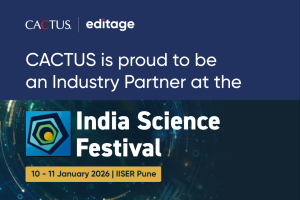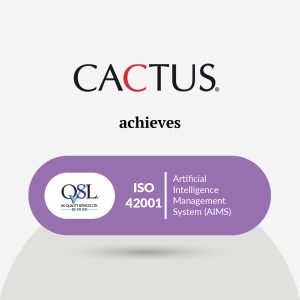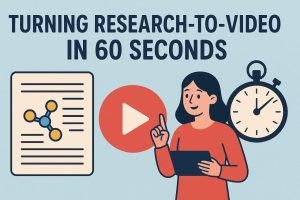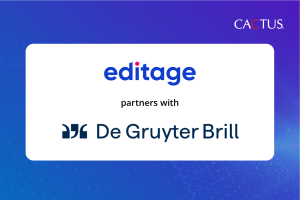Clarinda Cerejo, Vice President, Content and Community, CACTUS, was interviewed by EASE for their August issue of the EASE Digest. The European Association of Science Editors (EASE) is an international community of editors from diverse backgrounds, linguistic traditions, and professional experience who share an interest in science communication and editing. Clarinda spoke to them about her career as an editor with CACTUS and what an important role editors play in scientific communications.
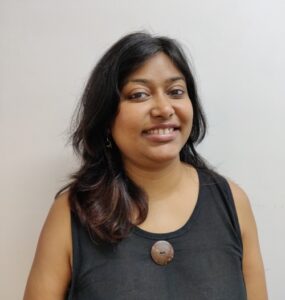
This interview has been reproduced with permission from EASE.
Interview with an editor
Clarinda Cerejo
Clarinda works for Editage Insights, a large, global, multilingual learning and community platform for researchers, available in English, Chinese, Japanese, and Korean.
The platform empowers researchers globally to overcome the challenges they face, by offering them resources customized to their research and publication needs, a space to share stories and hear from other researchers around the world, structured learning courses and a Q&A forum that addresses common questions and concerns.
What type of editorial work do you do?
As editor-in-chief, my work involves overseeing the overall editorial strategy and operations across all language versions of Editage Insights. This includes providing input on the monthly editorial calendar, which directs the content strategy; commissioning guest posts; conducting interviews; and reviewing and relaying analytics that inform us about how the site is doing and which posts are getting a lot of attention. I also lead projects like global researcher surveys – we published one on publication-related challenges researchers face in October 2018 (editage.com/insights/series/editage-global-author-survey), and we are currently running one on mental health in academia (cactusglobal.com/mental-health-survey/ ). Another important project I’m currently involved in an editorial capacity is a brand new AI-based platform we have launched to unite researchers in the global battle against COVID-19 (covid19.researcher.life/).This is a very exciting initiative!
How long have you held this position?
Having built Editage Insights from the ground up, I’ve been editor-in-chief since its inception – six and a half years now, to be exact. I keep jumping onto other projects within my organization as they come up, and they keep coming up, so there’s never a dull day.
What made you become an editor originally?
Before becoming editor-in-chief of Editage Insights, I played many different editorial roles in Cactus Communications (our parent company, cactusglobal.com/), starting as an academic editor for biomedical and life science research papers and then moving on to training new editors and conducting quality checks on edited manuscripts. I joined CACTUS shortly after completing my Master’s in Biotechnology – so straight out of college. During my Master’s, it became clear that I was fascinated by research but didn’t want to work in a lab. That’s when I received a recruitment promotion from CACTUS saying “Do you love science? Do you love English?”, inviting me for a position to edit research papers. It seemed like the perfect way to stay in touch with research while giving rein to my natural flair for nit-picking at the written word to turn it into something beautiful. So it started out as just an exciting opportunity to explore but ended up being a match made in heaven.
How did you learn to be a good editor?
CACTUS has a very stringent and rigorous training programme for all editors. Back when I joined, it included eight modules on the use of the comma! Apart from going through many self-guided learning modules on all aspects of sentence construction, grammar, and style, junior editors received a lot of feedback from senior editors — all our edits were reviewed for the first few months. We also received feedback from clients themselves — the researchers whose manuscripts we edited. It was such a joy whenever a client wrote in to let us know that their paper was accepted for publication in a journal.
I’ve also been certified by the Board of Editors in the Life Sciences (BELS), and regularly attend conferences like those of EASE, CSE, ISMTE, and SSP, where I have the treasured opportunity to learn from others in the industry. It definitely helps to have an employer that puts a strong emphasis on continuous learning and fully supports my professional development. I’ve been lucky.
What do you enjoy most about being an editor?
The final product! You know how you can stare at a convoluted sentence and mull over it for a while and then in a lightbulb moment you know exactly how to rephrase it and what words to replace? And then you love how it reads so much that you read it over and over. I think for most academic editors, at the core of it, it’s the gratification of reading a perfectly framed sentence that you helped make perfect. And then of course there are the more noble things that give me a sense of purpose, like the contribution I am making to research and researchers, to helping science go from labs to policy, and to indirectly changing the world in a big way. 🙂
And what are the greatest challenges?
I think while I was an academic editor, the biggest challenge was that it could get monotonous. Editing the technical language of non-native English speakers every day can be very intensive and brain-draining. And, of course, it could get frustrating when I just could not understand exactly what the author was trying to say and the best I could do was make a guess. At times like these, I had to keep reminding myself of the end game – that I was helping authors who are doing great research but are limited by language, to get their research out to the world. As a website editor, the challenges are very different – ensuring that the quality of all editorial output meets the required standards, chasing guest contributors and interviewees for their submissions on time (like I had to be chased for this interview), promoting the material that you publish so that it’s read widely enough to have the necessary business impact, maintaining costs within budgets, etc. It’s always a balancing act — quality versus quantity, costs versus scale, timeliness versus thoroughness.
What have you learnt that you would like to pass onto other editors?
As editors we often tend to become pedantic and slaves to process. And this is not all bad, because we’ve taken time to hone our processes, and these well-established processes serve us well, for the most part. But this approach also might make us blind to new possibilities, better ones. Just as we sometimes need to break a grammar or punctuation rule for better artistic flair in a piece of writing, we should allow ourselves a bit of experimentation and risk-taking to see if the processes we use need to be broken to make way for new ones. I can think of many situations on Editage Insights where I’ve been pleasantly surprised by the results of experiments I have been hesitant to run. For example, earlier all our content used to be created by an in-house team. At some point we felt the need to scale and realized we couldn’t do this with only the in-house team, and we thought that we should try inviting contributions. Of course, the team had all the reservations editorial gatekeepers usually have – how will we maintain quality, what if people misuse the contribution feature to promote products, etc. But when we decided to take the leap, we were delighted to see that most contributions we received met our standards. People were taking the time to understand the nature and style of content on the site and who the readers were before submitting their contributions. Now we have over 100 guest contributors! And we’re so happy with the fresh perspectives and the variety in writing style. We would never have been able to achieve this scale if we hadn’t stopped to question our processes and take the risk. And of course, some risks you take might backfire, but it’s still better to explore them and understand exactly why they won’t work for you than to remain in a bubble of assumption that your established process is the best.
If there was anything you could change about the writing, editing, reviewing and publishing process, what would it be?
I think my view here is aligned with my previous comment. The editorial system in academia has been too slow to change, because many of the people involved are sticklers for process and can’t see the forest for the trees. This has led to the editorial systems of many journals becoming overburdened with increasing volumes and diversity of submissions, all shouldered by the same editorial teams and processes. The COVID-19 scenario is an excellent case in point: I’m coming across so many discussion forums where editors are wondering how to sustain their editorial processes in the wake of high volumes of COVID-19 related research papers that need to be processed fast and with high quality. Perhaps if these processes had been questioned previously to allow for continuously scaling up, editors would not be so overwhelmed right now? It’s heartening to see that many publishers are now looking at technology and AI-powered solutions to support their editorial teams, although there’s still a long way to go. I would like to see editors themselves start being more experimental, proposing new changes to old systems, and thinking futuristically beyond their daily editorial responsibilities.
Can you suggest something that has recently happened that validates the need for scholarly/research/academic editors?
I can’t think of a specific Aha! moment I’ve had, but like I mentioned earlier, beautifully edited writing is a joy to read. In these days when we’re all quarantined at home and probably reading more academic material than ever (research papers, reports, and news articles about coronavirus research), can you imagine how awful it would be if all the stuff we had to read was never edited? That’s how important we are. Enough said!
Connect with Clarinda Cerejo


